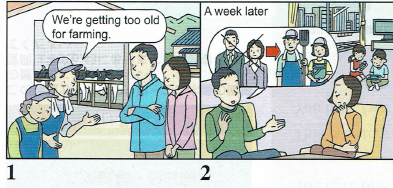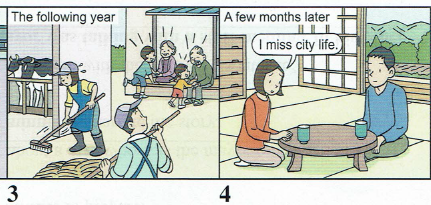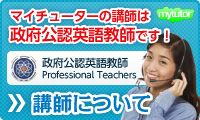英検準1級 二次試験(面接)とは

英検準1級 二次試験(面接)の合格率は2012年から
公開されなくなりましたが、推定80%の合格率です。
5人に4人が合格する試験なので、しっかりと対策をすれば
必ず合格すると言っても良いでしょう。
試験は、4コマのイラストに基づいて2分間のナレーションをし、
面接官の質問(4問)に答えるというものです。
今回はイラストに基づくナレーション対策・攻略のポイントをご紹介します。
二次試験(面接)の攻略ポイント

▮ イラストの展開には法則がある
ナレーションを考えるときは、起承転結のストーリー展開を意識しながら、
1つ1つの文章を簡潔・手短に述べていくとまとまりやすいと思います。
1コマあたりの文章は2~3文で十分です。
4コマ イラストの展開には以下のような法則があります。
1コマめ(起):現代社会にありがちな問題が起こる
2コマめ(承):それを解決しようと「中心人物」が行動を起こす
3コマめ(転):問題が解決したかに見える
4コマめ(結):しかし、その解決策のせいで新たな問題が起きてしまう
など、因果関係のある構成になっています。
結末で困った状況となることが多いので、
事態がどのように推移した結果そうなったのか、
明快に説明できるよう話を組み立てましょう。
▮ 全て過去形を使う
ナレーションは、すべて第三者(受験者)が既に起きたことを
説明する形になるため、過去形を使うことを忘れないようにしましょう。
吹き出しのセリフがある場合は、
「XX said」と前置きしてからそのまま引用します。
余裕のある方は「XX asked」など、
いくつかバリエーションを頭に入れておいても良いと思います。
また、進行中の動作については過去進行形を使いましょう。

▮ 各コマ冒頭は時間表現がら始める
各コマにつき、「いつ」「誰が」「何をした」で1文、
「誰が」「何と言った」で1文、「誰が」「どのように感じた」
で1文という調子で、3文ずつ話すとよいでしょう。
2~4コマめには A week later などの時間の推移
を表す語句がよく書かれています。
ストーリーの流れが明快になるので、
各コマ第1文の冒頭はこの時間表現で始めるようにしましょう。
―― 問題例 ――
You have one minute to prepare.
This is a story about a married couple who worked in a big city.
You have two minutes to narrate the story.
Your story should begin with the following sentence:
One weekend, a couple was visiting the man’s parents’ farm in the countryside.


出典: 英検準1級二次試験 2017年度第2回
――解答例――
One weekend, a couple was visiting the man’s parents’ farm in the countryside. They looked concerned to hear that the parents thought they were getting too old for farming.
A week later, the couple was back at their apartment in the city. They were talking in the living room, and the man suggested that they quit their jobs and go to the farm to help with the farm work. The man’s wife looked unsure about whether that was a good idea.
The following year, the couple had returned to the farm. They were working outside, and the man was pleased to see that his parents were enjoying the opportunity to spend time with their grandchildren.
A few months later, however, the man’s wife told him that she missed city life as they were sitting at the table.
英検準1級 二次試験(面接)対策 特訓ゼミはこちらから
















